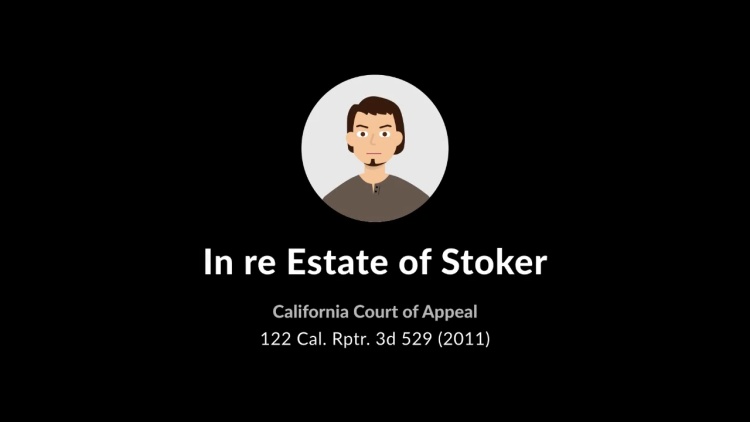In re Estate of Stoker
California Court of Appeal
122 Cal. Rptr. 3d 529 (2011)

- Written by Sara Rhee, JD
Facts
On May 22, 1997, Steven Wayne Stoker (Stoker) executed a will naming Destiny Gularte and Donald Karotick (plaintiffs) as beneficiaries of certain personal property and leaving the residue of his estate to the trustee of a trust he created the same day. Gularte, Stoker’s girlfriend, was the named trustee. However, Stoker and Gularte subsequently separated on bad terms. On August 25, 2005, Stoker dictated and signed a handwritten document that expressly revoked the 1997 trust. The document further provided that Gularte would receive nothing and that everything would go to his children, Danine Pradia and Darrin Stoker (defendants). The will was not signed by any witnesses. Stoker died on February 27, 2008. On March 17, 2008, Gularte filed a petition to have the 1997 will probated. Pradia objected and, on April 28, 2008, filed a petition to probate the 2005 will. At trial, Anne Marie Meier, Stoker’s friend, testified that Stoker had dictated the 2005 will to her, she handwrote it, and she witnessed Stoker signing it. Meier also testified that Stoker told her the document was to be his last will and testament. Another friend, Homer Johns, also testified to witnessing Stoker sign the 2005 will. Additionally, a third friend, Gretchen Landry, testified that in 2001 Stoker had urinated on and burned the 1997 will. The trial court found that the 2005 will was valid and that the 1997 will had been revoked. Gularte and Karotick appealed.
Rule of Law
Issue
Holding and Reasoning (Gilbert, J.)
What to do next…
Here's why 907,000 law students have relied on our case briefs:
- Written by law professors and practitioners, not other law students. 47,100 briefs, keyed to 996 casebooks. Top-notch customer support.
- The right amount of information, includes the facts, issues, rule of law, holding and reasoning, and any concurrences and dissents.
- Access in your classes, works on your mobile and tablet. Massive library of related video lessons and high quality multiple-choice questions.
- Easy to use, uniform format for every case brief. Written in plain English, not in legalese. Our briefs summarize and simplify; they don’t just repeat the court’s language.





